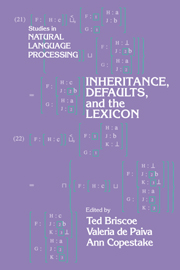Book contents
- Frontmatter
- Contents
- Contributors
- 1 Introduction
- 2 Skeptical and Credulous Default Unification with Applications to Templates and Inheritance
- 3 Prioritised Multiple Inheritance in DATR
- 4 Some Reflections on the Conversion of the TIC Lexicon into DATR
- 5 Norms or Inference Tickets? A Frontal Collision between Intuitions
- 6 Issues in the Design of a Language for Representing Linguistic Information Based on Inheritance and Feature Structures
- 7 Feature-Based Inheritance Networks for Computational Lexicons
- 8 A Practical Approach to Multiple Default Inheritance for Unification-Based Lexicons
- 9 The ACQUILEX LKB: An Introduction
- 10 Types and Constraints in the LKB
- 11 LKB Encoding of Lexical Knowledge
- 12 Defaults in Lexical Representation
- 13 Untangling Definition Structure into Knowledge Representation
- Appendix A A Bibliography of ACQUILEX Papers Connected with the LKB
- Appendix B The LKB Description Language Syntax
- Appendix C Software Availability
- References
- Author index
- Subject Index
1 - Introduction
Published online by Cambridge University Press: 01 April 2010
- Frontmatter
- Contents
- Contributors
- 1 Introduction
- 2 Skeptical and Credulous Default Unification with Applications to Templates and Inheritance
- 3 Prioritised Multiple Inheritance in DATR
- 4 Some Reflections on the Conversion of the TIC Lexicon into DATR
- 5 Norms or Inference Tickets? A Frontal Collision between Intuitions
- 6 Issues in the Design of a Language for Representing Linguistic Information Based on Inheritance and Feature Structures
- 7 Feature-Based Inheritance Networks for Computational Lexicons
- 8 A Practical Approach to Multiple Default Inheritance for Unification-Based Lexicons
- 9 The ACQUILEX LKB: An Introduction
- 10 Types and Constraints in the LKB
- 11 LKB Encoding of Lexical Knowledge
- 12 Defaults in Lexical Representation
- 13 Untangling Definition Structure into Knowledge Representation
- Appendix A A Bibliography of ACQUILEX Papers Connected with the LKB
- Appendix B The LKB Description Language Syntax
- Appendix C Software Availability
- References
- Author index
- Subject Index
Summary
In recent years, the lexicon has become the focus of considerable research in (computational) linguistic theory and natural language processing (NLP) research; the reasons for this trend are both theoretical and practical. Within linguistics, the role of the lexicon has become increasingly central as more and more linguistic generalisations have been seen to have a lexical dimension, whilst for NLP systems, the lexicon has increasingly become the chief ‘bottleneck’ in the production of habitable applications offering an adequate vocabulary for the intended task. This edited collection of essays derives from a workshop held in Cambridge in April 1991 to bring together researchers from both Europe and America and from both fields working on formal and computational accounts of the lexicon. The workshop was funded under the European Strategic Programme in Information Technology (ESPRIT) Basic Research Action (BRA) through the ACQUILEX project (‘Acquisition of Lexical Information for Natural Language Processing’) and was hosted by the Computer Laboratory, Cambridge University.
The ACQUILEX project is concerned with the exploitation of machine-readable versions of conventional dictionaries in an attempt to develop substantial lexicons for NLP in a resource efficient fashion. However, the focus of the workshop was on the representation and organisation of information in the lexicon, regardless of the mode of acquisition.
- Type
- Chapter
- Information
- Inheritance, Defaults and the Lexicon , pp. 1 - 12Publisher: Cambridge University PressPrint publication year: 1994



